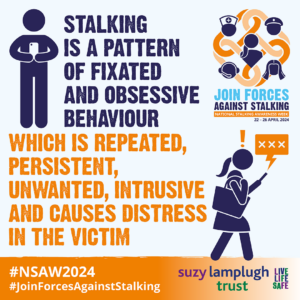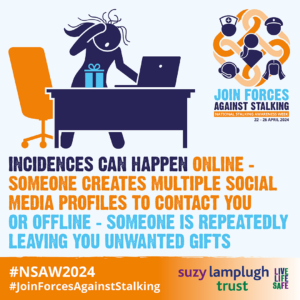Stalking Awareness Week 2024
Stalking can happen to anyone at any time by men or women. It is one of the most frequently experienced forms of abuse and can be identified as a pattern of fixated and obsessive behaviour, which is repeated, persistent, intrusive and causes fear of violence or engenders alarm and distress in the victim*.

If an individual is receiving persistent and unwanted contact that is causing distress, but the perpetrator has never threatened them, this is still stalking.
Stalking behaviours can escalate quickly and stalking should be considered as a high-risk factor which can lead to significant harm/distress and in some cases murder.
Examples of stalking behaviours are:
- Regularly following someone
- Repeatedly going uninvited into someone’s home
- Checking someone’s email, internet use, or other electronic communication
- Hanging around places knowing their victim often visits
- Interfering with someone’s property
- Spying or watching someone
- Identify theft
Online stalking
With online accessibility being at our fingertips, social networking sites, chat rooms, gaming, and forums are often used as platforms to stalk someone. Via these platforms stalkers can:
- To get personal information
- To communicate – calls, text, email, create fake accounts
- Damage someone’s reputation
- Spam and send viruses
- Identity theft
- Threats e.g. to share private information, photos, messages

Warning signs
There are four warning signs of stalking – if the behaviour an individual is experiencing is:
Fixated
Obsessive
Unwanted
Repeated
You can report the crime to your local police or contact the National Stalking Helpline for more advice.
Who can be a victim of stalking?
Anyone can become a victim of stalking. A report in which 2,292 victims of stalking were surveyed, found that victims are:
- Aged between 10 – 73-years old
- Female and male
- Spread across the entire socio-economic spectrum
- From many working areas, and a large proportion (38%) were professionals
Stalking and domestic abuse
Stalking can affect survivors of domestic abuse in every area of their lives, including having a negative impact upon a person’s mental and physical wellbeing. Individuals who experience stalking may go on to adapt to their day-to-day lives to manage risks, which could include leaving their jobs, moving house, or stopping going out and seeing friends.
Often survivors will not recognise that they are experiencing stalking behaviours and there are often misconceptions around stalking being linked to a display of romance or affection, which can lead others to not acknowledge the dangers that these behaviours can lead to. Some survivors may also feel that others won’t take them seriously or believe that they are experiencing stalking behaviours.
It is vital that we use National Stalking Awareness Week to raise the awareness of stalking behaviours, how this can form a pattern of domestic abuse, and the impact that this behaviour can have upon the lives of survivors. It is essential that support services become better equipped to identify and recognise stalking behaviours to advocate for survivors effectively and ensure that they can access appropriate support to address safety and risk concerns.
Get support
If you or someone you know are concerned about stalking and domestic abuse and you live in Mansfield or Ashfield, please contact us:
- Call: 01623 683 250
- Email: [email protected]
For stalking advice and support, contact the National Stalking Helpline:
- Call: 0808 802 0300
- Visit the Suzy Lamplugh Trust website for information and advice
*As defined by the Suzy Lamplugh Trust